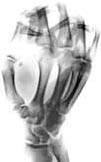
| Records | Reviews | Tracks | Concerts | Gallery |
Press ReleaseFaustPolydor, Mar 1971Great things are happening in Germany. Developments are taking place which could change the face of rock music for the next decade. Already the outside world has heard indications of what's going on in the music of groups like Amon Düül 2 and Can. In Germany itself many other groups are making daring, experimental music and building up solid and serious followings. Unlike rock musicians in other countries this new breed of German musicians is not interested is imitating what's gone before them - they're looking for new sounds and new forms of expression. Their music is no hand-me-down Beatles or Stones, or the white man's idea of R&B - it's their own, building as much on the immense tradition of German music as on the Anglo-Saxon dominated traditions of current pop. And the way they're working at it, the rock tide could soon be flowing in the opposite direction. Faust have taken the search for new sounds farther than any other group. Their music is technological rock taken to extremes: "In every country musicians are beginning to synthesize new sounds. The trouble is that this hasn't been done consistently enough. As a musician one now needs enough understanding of electronics to systematically build the instrument which will produce exactly the sound one wants to hear. The ideal is for each musician to make his own instruments." Since spring 1971 Faust have been putting this theory into practice, living in almost monastic isolation in the north Gertman countryside between Hamburg and Bremen. The former schoolhouse in which they live also serves as their studio and sound laboratory - the old classroom is filled with a jungle of electronic equipment, with 8-track recording facilities. In October 1971 their first album was completed. The music on it is provoking, dissonant, sometimes serious, sometimes tongue-in-cheek, but always unpredictable. New tones, textures and effects are made even more startling by being set against conventional, even corny instrumental groupings. The lyrics sung, intoned, shouted or whispered, are used for atmosphere as much as for their literal sense. Extreme aural violence alternates with moments of peacefulness. If it sounds like anarchy at first, further listening brings out the intentions behind even its most disinterested passages. Faust are now well into their second album, and can look back on the first objectively: "It's not a record you can listen to all day, but when you've been 1istening to other kinds of music it's really good to hear it. Perhaps it's a fault of the album that the moods shift so suddenly. But it's a perfect reflection of the situation we were in when we made it. At that time we were rather dogmatic. We felt that our ideas had to be protected, that they were threatened by the system, the business, that music has to go through now. We were frightened that our ideas would get lost in all this. but since then we've seen that when our ideas are good, however much they depart from the norm, they get through. We no longer say that there are some things we would never do in any circumstances. We've got to the stage now where we're making music of many styles. We don't want the music to be bracketed and labelled - it should be quite clear to those who listen to it whether it's serious or light-hearted, music to make you think or music to make you feel good. And we've nothing against dance music either - we can use the sounds and effects we 've developed in such a way now that people are going to really want to get up and move around to them." Faust want to perform their music 'live' as soon as possible, and the second side of the LP was recorded under live conditions in the studio at Wümme. But they insist that the sound they bring to the stage must be exactly the sound which they have developed in the studio - and for that they need transportable equipment which is still being put together. Until then Faust will have to be judged on their recorded output - but there's enough on the first LP alone to suggest that the direction Faust are going in is the direction which everybody else is going to follow. Faust are: Werner Diermaier Joachim Irmler Jean-Hervé Péron Rudolf Sosna Gunther Wüsthoff Faust, "Press Release", Polydor 1971 |
|